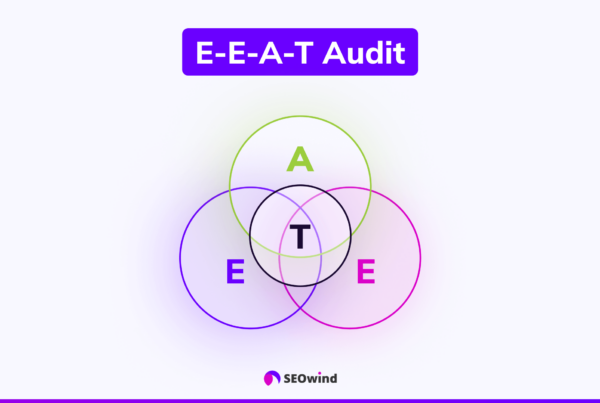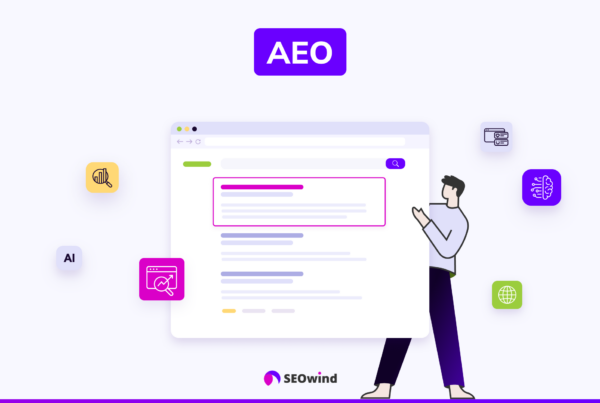How often do you think about how much we’ve come to rely on Artificial Intelligence? Take a brief pause and look around. Whatever device you’re reading this on likely includes some form of AI. From voice assistants and predictive texting to the recommendations Netflix produces for your next binge-watch, it’s all part of the AI framework.
Now let me take you on another expedition into content creation powered by Artificial Intelligence! Consider this your roadmap to understanding and using AI for content creation, a strategy that will undoubtedly electrify your existing methods.
What is AI Content Creation?
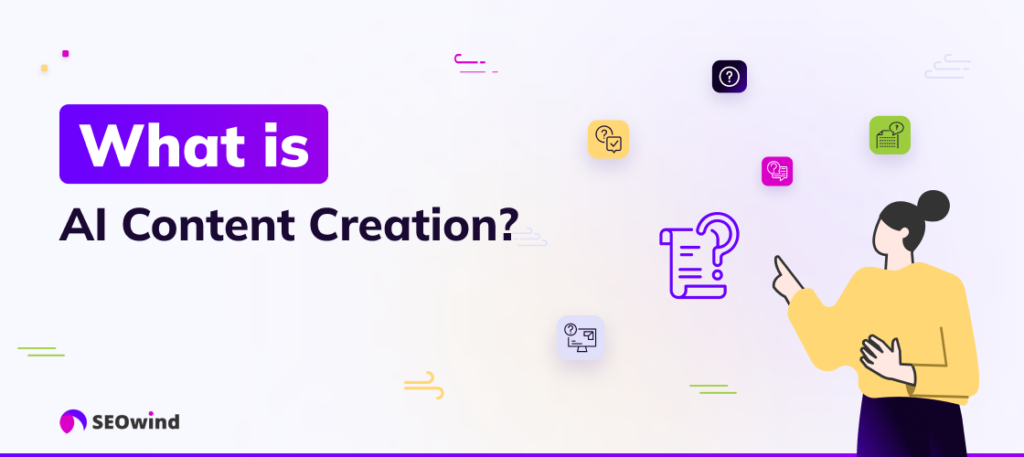
Artificial Intelligence (AI) has seeped into our lives unnoticed and changed our perception of almost everything. As with many other fields, AI’s influence on content creation can be quite transformative.
AI content creation is the process by which Artificial Intelligence creates written output without human intervention but under human guidance. It uses programmable frameworks integrated with machine learning algorithms, linguistic rules, data analytics, and comprehension models such as Natural Language Processing (NLP), altogether known as ‘AI tools for content creation.’
Creating content with AI involves feeding these systems information about a specific topic or asking them to write in a defined format or style. Subsequently, these programs follow specific algorithms and create personalized write-ups ranging from technical reports and creative articles to engaging social media posts!
The transition is stunningly swift, moving away from clichéd stereotypes about robots typing at light speed to intelligent systems capable of creating coherent sentences and even crafting persuasive storytelling narratives! It makes you wonder about the potential benefits of streamlining your creative processes, right? And this barely scratches the surface. Let’s dig deeper, shall we?
Benefits of Using AI for Content Creation
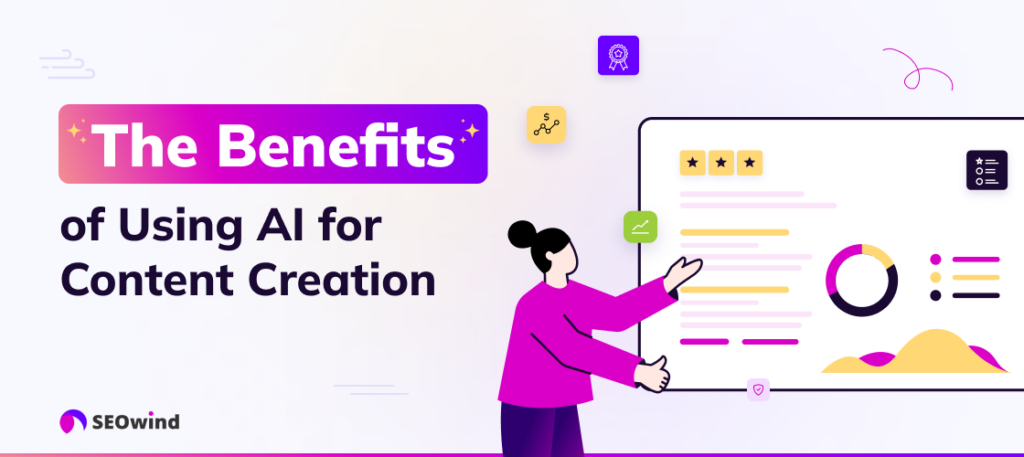
Efficiency in AI-Powered Content Creation
Firstly, using AI for content creation can significantly increase efficiency. These tools save human content creators precious time by automatically producing drafts or refining templates. They handle routine tasks quickly and precisely, allowing users to focus on more strategic elements such as tone adjustment or storytelling alignment.
Scalability of AI in Content Production
AI-powered content creation also excels in scalability. Unlike a human writer, who may have finite energy and focus within a 24-hour cycle, AI does not tire. It doesn’t matter if you need ten articles or a hundred; there’s no surge in fatigue or drop in output quality with Artificial Intelligence at the helm.
Enhanced Analysis and Data Handling with AI
Another primary benefit comes from faster analysis and superhuman data-handling abilities. AI can process vast amounts of data much faster than any human could achieve. As a result, Artificial Intelligence provides invaluable insights into SEO optimization or sentiment analysis that can drive strategic decisions and revamp the effectiveness of your content.
Personalization Through AI Content Tools
AI tools are also evolving to deliver increasingly personalized experiences with dynamic creative capabilities. They can analyze user behavior patterns and react adaptively in real-time, offering tailor-made content that boosts engagement rates significantly.
Consistency Maintained by AI in Branding
Finally, consistency is an often overlooked yet crucial trait in successful branding strategies. With predefined rules and guidelines, AI seamlessly reinforces your brand presence by ensuring uniformity across all platforms, whether you’re publishing blog posts, social media updates, or email marketing campaigns.
Having this broader understanding helps reinforce why creating content with AI isn’t just a fleeting trend. Instead, it’s an intelligent strategy worth considering for anyone striving to boost their productivity while maintaining an unwavering commitment to top-notch quality control.
The Process of Using AI for Content Creation
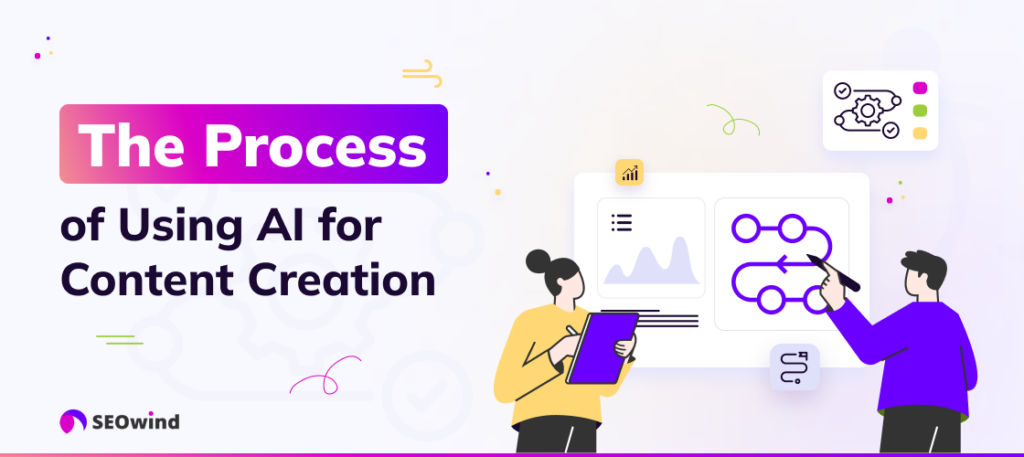
Whether you’re new to the concept or familiar with its application, understanding how to use AI for content creation can significantly transform your content marketing strategy. What follows is a detailed walkthrough for using Artificial intelligence in every step of your process.
How to Use AI to Generate Content Ideas
Consistently generating new ideas can be taxing even for the most prolific writers. Thankfully, AI tools for content creation can simplify this process.
For instance, an AI tool such as Content-Ideator uses keywords related to your industry and studies what’s trending to come up with fresh topic suggestions. Meanwhile, BuzzSumo uses Artificial Intelligence to analyze what type of content will drive engagement by scrutinizing what works best for your competition or the wider industry.
By tracking trending topics and generating original ideas, these tools ensure that all stages of content creation are handled with expertise and precision.
Creating Outlines and Structures with AI Assistance
It’s often tricky to create a coherent structure from a bunch of content ideas. Cue Artificial Intelligence. Once you have decided on a topic, you can integrate an AI application like Writtin.ai, which presents you with an optimal outline by analyzing several high-ranked articles on similar subjects.
By using AI-powered content creation at this stage, you lock down a structure and identify critical points your audience is interested in reading about. This way, you focus on relevance and context right at the planning stage.
Writing First Drafts with the Help of AI Tools
Converting outlines into first drafts is where the actual writing begins. While it seems counterintuitive at first, some services offer pre-trained machine-learning models capable of composing human-like text.
Among such platforms is the automated service Jasper, which leverages OpenAI’s world-famous GPT-3 technology, enabling users to write quality drafts faster. Jasper can produce nearly complete articles with minimal supervision once a user feeds it a precise brief. Early drafts from the application are ready for tweaking rather than starting from scratch, proving its value in accelerating your writing process.
Conducting Fast-Track Research with The Use of AI Tools
Further bolstering your content authority involves efficient fact-checking and research. One excellent example is Frase, a content tool that offers an AI assistant for building more topical relevance. It helps you compete on search engine result pages (SERPs) by comprehensively analyzing targeted keywords to know what’s already there and identify gaps in your current content.
Another helpful resource is MarketMuse, which utilizes AI for content creation to help you cover topics thoroughly. The solution provides comparative, data-backed outlines based on top-performing posts across your industry.
Using AI for Keyword Research and Clustering
Capitalizing on organic traffic hinges on keyword usage. Tools like SEMRush or Ahrefs leverage Artificial Intelligence to scour billions of related keywords that connect people’s searches to your message. As part of this process, they analyze competitor rankings and suggest terms underutilized within your sector.
Similarly, AI services like Market Brew enable clustering – grouping similar intent keywords together to help pages rank better – paving the way for domain-wide optimization strategies.
Incorporating these processes brings you face-to-face with how creating content with AI could revolutionize your practice and deliver efficiency at each phase while emphasizing human touchpoints throughout!
The Impact of AI on Human Content Creators
As we navigate this era of increased digital dependence, a question arises: can artificial intelligence truly replace human content creators? Let’s take a closer look.
Discussion on the Potential Role of AI in Replacing or Complementing Human Content Creators
Artificial Intelligence has undeniably made substantial waves in the realm of content creation. Be it drafting an initial copy for a blog post or generating unique captions for social media updates, AI tools for content creation are increasingly stepping up to help manage workloads.
However, does this indicate that AI is destined to fully take over and render human creators obsolete?
The answer isn’t as simple as a clear “yes” or “no.”
While these AI-powered systems undoubtedly speed up processes and streamline repetitive tasks, they lack one very crucial attribute: human context. They can provide raw data but cannot add emotion, nuance, humor, or anything else that gives writing its unique charm and personality.
Instead of viewing Artificial Intelligence in content creation as a threat poised to steal jobs from humans, we should consider it a tool designed to enhance our creations and make our lives easier. It complements rather than substitutes human skills by taking care of mundane tasks.
Ethical Considerations and Challenges Related To Using AI In Content Creation
Ethical considerations are often overlooked in discussions about how to use AI for content creation. As with any revolutionary technology, various ethical challenges arrive alongside exciting advantages when integrating Artificial Intelligence into our creative process.
One such area of concern is plagiarism; there are occurrences where data used by an AI system may inadvertently include copyrighted material. Another point of contention is predatorily targeting users because advanced personalization capabilities make manipulation easier.
Moreover, authorship acknowledgment becomes unclear when using AI tools for creating content. If the idea came from me but was written primarily by an algorithm belonging to a third-party provider, who does the credit go to?
Discussion on Potential Biases or Inaccuracies in AI-Generated Content
At the heart of every system powered by Artificial Intelligence is an algorithm trained by humans. As such, these algorithms can be subject to human biases and inaccuracies.
How so?
For the most part, this bias arises from training data employed during the machine learning phase. If the utilized data has inherent biases – intentional or unintentional – it impacts the neutrality of AI-generated content, potentially leading it astray toward unfair stereotypes or skewed perceptions.
We must remain vigilant about this possibility when creating content with AI and ensure that our training datasets are as representative and objective as possible.
Possible Risks Associated With Over-reliance On AI in Content Creation
Despite all its benefits, we should avoid becoming too reliant on using AI for content creation. Dependence could lead to an erosion of human critical thinking skills and the deterioration of unique storytelling elements that make content genuinely relatable.
AI excels at processes requiring precision and speed but lacks a personal touch, an element intrinsic to human nature. There is also the risk of over-automation, causing soullessness to creep into text empty of human input. Generally speaking, it could result in a monotonous homogeneity in digital communication spaces if not monitored closely.
So, while integrating Artificial Intelligence into our creative procedures undoubtedly provides various benefits, maintaining balance is essential.
The Role of AI in Specific Areas of Content Creation
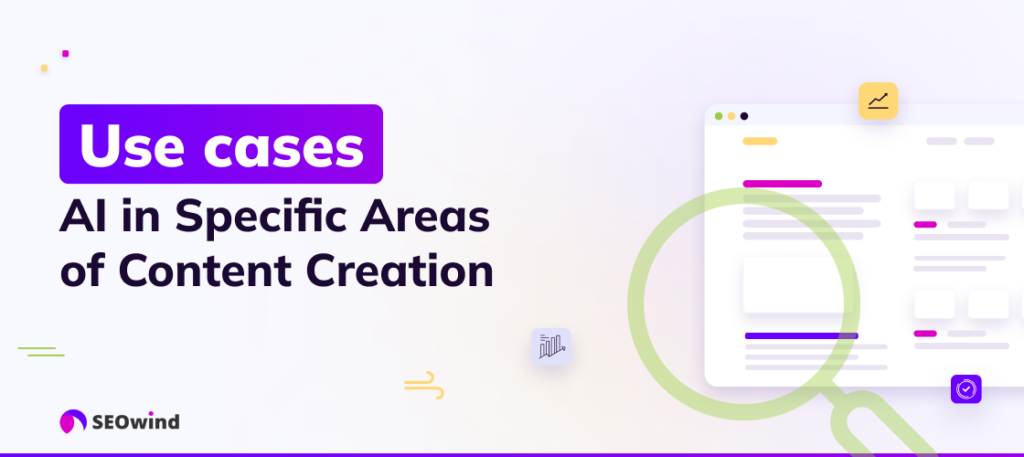
Artificial Intelligence has dug its roots deep into various facets of content creation, with each industry leveraging it uniquely. Let’s explore some specific areas where AI is revolutionizing the process and output, from blog post writing and research to social media content making.
Using AI for Blog Post Writing and Research
AI tools leverage specialized algorithms to conduct comprehensive research, curate information from diverse sources, and structure the cluttered data logically.
Firstly, an AI writing tool like Jasper can generate unique topic ideas based on your target niche or keywords. Furthermore, it helps analyze audience behavior using emoji and emoticon reaction analysis and finds patterns in their preference. Lastly, it churns out rough drafts while requiring minimal human intervention.
The biggest perk? The amount of time saved! This swift collection of raw materials gives you the foundation to build an SEO-friendly blog post.
Creating Engaging Social Media Posts with the Help of AI Tools
Creating engaging social media content on a daily basis can be exhausting! Fear not, as this is where Artificial Intelligence in content creation steps in!
Imagine having a smart assistant who uses machine learning (ML) algorithms to understand your brand voice, study engagement metrics, and monitor user reactions all at once!
Tools like Copy.ai harness AI power to produce catchy post captions, original hashtag combinations, or compelling bios that resonate with an audience persona. And omnipresent chatbots answer queries instantly without burning the midnight oil!
These tools streamline posting schedules across varied platforms, resulting in effective AI-powered content creation that is time-efficient and drives up interaction levels.
AI-Generated Email Marketing Campaigns and Strategies
Every successful email marketing campaign includes rigorous behind-the-scenes planning to segment audience lists and craft intricate messages. Altogether, this makes for a tedious process indeed! But getting AI onboard can substantially simplify the process!
AI content creation tools pull audience data to send personalized emails – a key to improving conversion rates. In addition, Artificial Intelligence can suggest optimal email-sending times and AB testing subject lines.
Through their predictive analytics feature, AI writing solutions assess recipients’ behaviors and automate responses best suited for them, orchestrating an efficient system that significantly boosts open-rate metrics.
Podcast Production and Editing with the Assistance of AI
Last but not least, let’s discuss another rising star in the content world: podcasts. And what’s fueling its ascent? The use of AI.
Today’s advanced Artificial Intelligence for content creation aids in different stages of podcast production, from noise reduction and audio enhancement to transcribing episodes. Tools like Descript offer unique features like “Overdub” for text-to-speech sound editing in the original speaker’s voice!
Moreover, data-driven insights about listener demographics and preferences assist in customizing future episode themes, thereby sculpting successful strategies tailored to audience demands.
Ultimately, the imprint of AI is becoming ever-more noticeable in these specific areas and rejuvenating conventional processes with high-efficiency results.
Top AI Tools for Content Creation
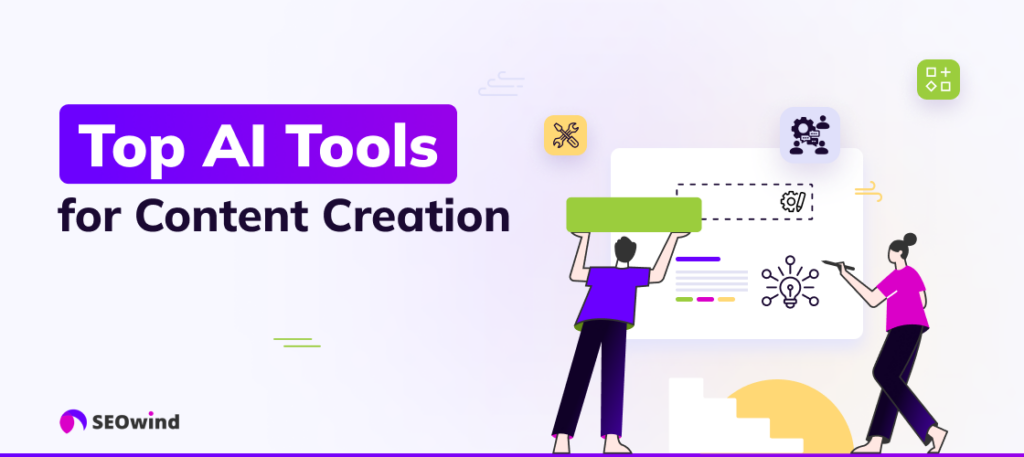
There are a lot of practical tools to support content generation. Whether we’re talking about brainstorming ideas, undertaking research, writing drafts, or final proofreading, each process involves innovative solutions powered by Artificial Intelligence. In this section, we’ll review my recommendations for the cream of the crop regarding tried and tested AI platforms: SEOwind, Jasper, and Copy.ai.
SEOwind – AI Writer based on research
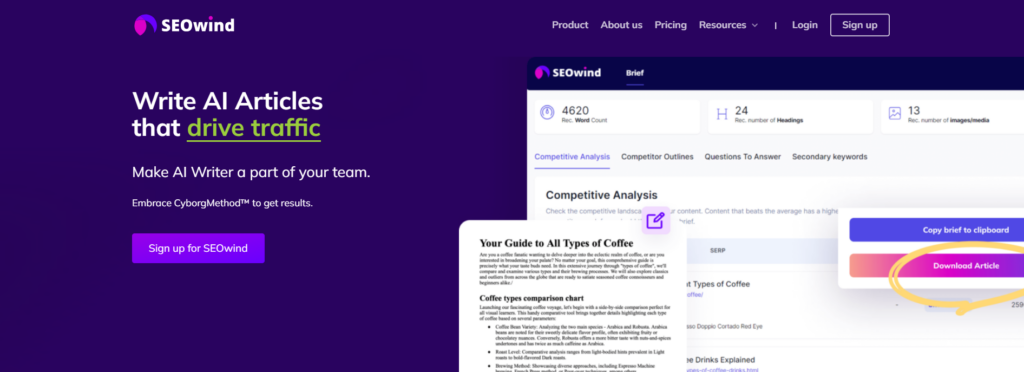
SEOwind emerges as a cutting-edge AI writing assistant, revolutionizing the content creation process. It’s designed to amplify the productivity of writers by generating high-quality articles anchored in robust SEO research. This tool is the brainchild of seasoned veterans in SEO and AI, translating to a deeply integrated and efficient content crafting experience.
Harnessing the power of the innovative CyborgMethod™, SEOwind champions the synergy between human creativity and AI efficiency. Users can produce content quintupled in volume without compromising quality, ensuring each piece resonates with their unique brand voice.
At its core, SEOwind excels in conducting exhaustive content and keyword research. The platform’s prowess extends to creating detailed outlines that serve as blueprints for articles optimized to attract and engage traffic. This seamless fusion of research and writing propels content to the forefront of search visibility.
Moreover, SEOwind supports crafting content in 12 languages, including English, Spanish, and French. Companies aiming to elevate their global content strategy will find SEOwind an invaluable ally, enabling them to scale their content process and maintain a distinctive human touch.
Jasper

Next up on our list is Jasper. This responsive AI assistant boasts robust capabilities in generating compelling narratives from mundane prompts while ensuring the steady preservation of a unique brand voice and tone across all generated content pieces.
Jasper shines bright as an auxiliary companion aiding you in swiftly converting raw ideas into polished prose. Doing so saves ample time by sidestepping the lengthy editing processes usually customary with first drafts. Additionally, this intuitive software flaunts an impressive ability to craft ad copy that catches eyeballs while succinctly portraying core brand virtues. Whether you’re looking to create captivating blog posts or high-engagement social media content, Jasper could be your go-to answer.
Copy.ai
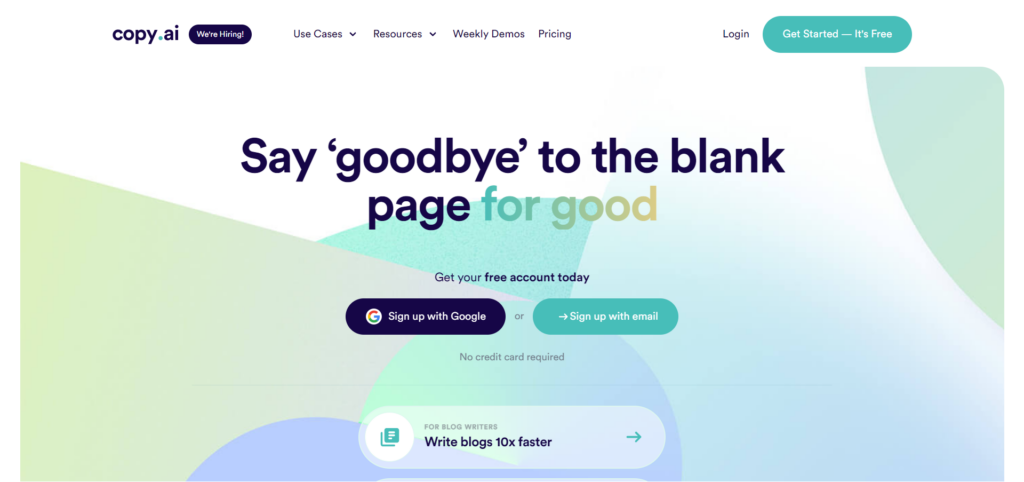
No discussion regarding cutting-edge AI tools for content creation would reach a meaningful conclusion without paying due homage to Copy.ai, a testament to modern digital empowerment emancipating content creators from the shackles of creativity blockade and tight deadlines.
Copy.ai operates as your personal brainstorming partner. Provide it a context, ask for ideas, and watch in amazement as innovative and unexpected concept suggestions spring forth! Enjoy this treasure chest brimming with persuasive social media captions, clever product descriptions, and niche blog intros. Copy.ai is quite literally an all-rounder tool suitable for any form of written communication requirements.
Moreover, the tool’s built-in plagiarism checker ensures that all generated content remains unique and respects established intellectual property rights while maintaining the quality expected of human-crafted literary pieces.
Remember that these are not standalone bots that can work unsupervised. AI writing tools are intelligent support systems designed primarily to assist content experts in realizing their vision. Exploring such integrations provides glimpses into revolutions poised to fuel the content industry’s future landscape.
With a surge in technology enabling us to explore the expansive potential of AI for content creation, it is beneficial to establish best practices. These well-structured methods aim to guide you through creating more meaningful and impactful output while avoiding the potential pitfalls of AI misuse.
Best practices for using AI in Content Creation

Make Your Intention Clear
Defining your intention is essential when using Artificial Intelligence in content creation. The plethora of possibilities AI presents could lead to unnecessary complications without clear-cut goals. Are you aiming to boost your SEO rankings or increase social media engagement? Perhaps you’re looking to automate email marketing campaigns. Determining your objective will simplify your journey significantly.
Don’t Neglect the Human Touch
While AI tools offer exceptional benefits, the human touch in content should never be undervalued. Always remember that AI is an assistant; it cannot wholly replace human creatives’ intuition, emotional connection, and unique perspective. Strive to strike a balance between leveraging the efficiency of robotic systems and maintaining the originality inherent in raw human creativity.
Proofread and Refine AI Outputs
Relying solely on AI-generated content can inadvertently lead to context-blind flubs or factual inaccuracies passed over by AI algorithms. You must diligently proofread and refine any output from AI-powered tools before pushing them into a public space. This habit ensures more transparent communication while maintaining credibility with your readership.
Prioritize Learning About Using New Tools
Artificial Intelligence tools are continually evolving. Learning about these changes will keep you updated about the expanding capabilities and improved techniques these tools may provide for content creation with AI assistance.
To conclude this section, learning how to use AI for content creation effectively necessitates thoughtful user strategies and the preservation of authenticity despite automated processes being at play. With keen attention paid to practicing these actions, we navigate modern capabilities responsibly while extracting every possible advantage they can deliver for our digital endeavors.
Overview of How AI Technology Has Evolved in Content Creation
Artificial Intelligence has flourished over the years, and its advancements have dramatically revolutionized various industries. In content creation, we’ve witnessed a radical transformation mainly fueled by increased capability and improved accessibility.
Back in the 1950s, Artificial Intelligence existed merely as a theoretical concept. John McCarthy, often identified as the father of AI, only started spreading this idea during what is now famously known as the Dartmouth Conference held in 1956. Yet it wasn’t until several decades later that AI showed its actual influence on content creation.
The turn of the millennium saw search engines like Google initiate their efforts to better understand and index internet content. It led to increased demand for quality web copies and blog posts framed around using keywords optimally, giving birth to Search Engine Optimization (SEO). This phase marked the very early involvement of Artificial Intelligence in content creation.
By the late 2000s, rudimentary AI software appeared that could churn out simple narrative reports. While initially marred by rigid language structures and questionable creativity due to limited linguistic models, these essential tools paved the way for more refined predictive text instruments.
Today, sophisticated content creator AIs like GPT-3, developed by OpenAI, define the impact of AI on content creation. These systems utilize cutting-edge machine-learning technologies that accurately replicate human-like writing while including sentiments and emotions in the pieces they generate. This blurs the line between human-authored articles and those created with AI assistance.
Using AI for content creation isn’t an unreal futuristic vision anymore; it’s today’s reality and tomorrow’s norm. Neural networking advancements continue, leading to better natural language processing abilities. As a result, modern-day AI tools are excellent partners for crafting compelling narratives, no matter your industry or audience.
Whether you aim to keep up with these ubiquitous chatbots or you’re scouting to create content with AI for your blog posts, one can’t ignore the power of these intelligent machines to influence content creation strategy.
Understanding AI Algorithms for Content Creation
Before learning how to use AI for content creation, it’s necessary to comprehend the technology that propels this possibility. In essence, these technologies consist of complex algorithms that lie at the heart of Artificial Intelligence in content creation.
Overview of Different AI Algorithms Used for Content Creation
There are many different types of AI algorithms used in creating content, but three stand out as being particularly prevalent:
- Recurrent Neural Networks (RNN): These are powerful tools when handling sequences due to their ‘memory’ capability, enabling them to learn from previous inputs. For instance, they can remember the preceding words in a sentence while predicting the next one.
- Long Short Term Memory (LSTM): This subset of RNN has substantially improved memory capabilities and deals better with long-term dependencies. This enhancement makes LSTM exceptionally well suited to writing natural-sounding sentences.
- Transformers: Transformers excel at parallel processing and have contributed significantly to recent Artificial Intelligence content creation breakthroughs. They outshine other architectures regarding scalability, an essential component for training larger models.
Understanding these fundamental algorithms provides a foundation for appreciating Natural Language Processing and Machine Learning.
Natural Language Processing (NLP) and Machine Learning in AI Content Creation
The introduction of NLP and machine learning revolutionized the field of AI-powered content creation by adding a nuanced understanding of language.
Natural Language Processing (NLP) is a critical domain within AI that endeavors to comprehend, interpret, and generate human language in valuable ways. It allows computers to read text and understand context, sentiment, and sarcasm, essentially achieving fluency in human communication quirks that were previously exclusive to people!
On the other hand, Machine Learning allows systems to automatically learn from experience without explicitly programmed instructions. In content creation, Machine Learning algorithms learn the style and tone of a specific writer or a domain to generate similar texts thanks to copious amounts of data.
When combined, these two can make AI sound more human than ever by tweaking words and sentences until the resulting text is almost indistinguishable from a piece written by a human author.
Exploration of GPT-4 and Other Advanced AI Models Used in Content Generation
The recently released Generative Pretrained Transformer (GPT-4) represents one such advanced model pushing the boundaries of Artificial Intelligence for content creation. Trained on vast swathes of internet text, it excels when producing coherent and contextually relevant sentences.
Notably, other advanced models, such as Bidirectional Encoder Representations from Transformers (BERT), provide additional value by understanding the context from preceding and succeeding words. Similarly, RoBERTa, an optimized version of BERT developed by researchers at Facebook AI, capitalizes on dynamic masking and larger training batch sizes for enhanced performance.
Knowing how these diverse tools contribute to creating content with AI is instrumental in understanding how best to use them as part of your strategy. By recognizing these underlying mechanisms, you can leverage them effectively.
The Future of AI in Content Creation

Artificial Intelligence is making waves across sectors and industries, and content creation is no exception. It’s fascinating to envision how further advancements will shape the future of using AI for content creation. From enhancing the accuracy of predictive text entries to generating fully-fledged narratives, we’re in the middle of an exciting digital evolution.
Predictions and trends for the future of AI technology in content creation
Artificial Intelligence-Enabled Voice Assistants
In the near future, voice assistant systems like Alexa or Siri could be upgraded with advanced Artificial Intelligence to understand conversational nuances better. Imagine telling your AI assistant a brief concept and seeing a beautifully framed blog post appear on your screen!
Advent of Autonomous Journalism
Autonomous journalism powered by Artificial Intelligence could considerably improve reporting quality while expediting content delivery times. Smarter algorithms might start creating high-quality news articles with minimal human intervention.
Emotionally Intelligent AI Content Creators
To make interactions more human-like, future AI technologies may include emotionally intelligent capabilities, allowing them to perceive and react according to users’ emotions during a conversation.
Of course, these predictions merely scratch the surface of the myriad possibilities awaiting us. While it’s challenging to say exactly what lies ahead due to rapid technological advances that defy imagination at times, one thing remains certain: Artificial Intelligence in content creation has a promising path forward.
Innovations and Advancements Expected in AI Tools for Content Generation
AI tools employed for creating content are experiencing continuous innovations that contribute significantly to their efficiency. Let’s explore some potentially forthcoming advancements:
- Advanced semantic understanding abilities enable AI to understand context better, thus improving its proficiency in producing meaningful sentences.
- Increased adaptability lets AI customize its writing style based on specific instructions, whether you need a casual tone for social media posts or formal prose for white papers.
- Higher prediction accuracy will enable next-generation AI tools to predict upcoming trends, aiding content creators in staying ahead of the curve with their content strategy.
- Enhanced SEO optimization capabilities should improve search engine rankings and drive more organic traffic to our content.
Integrating advanced Artificial Intelligence into content creation isn’t merely a matter of “if” but “when.” The forward march of innovation means that AI is poised to become increasingly ingrained in our daily lives. This will open up new dimensions in how we conceive, create, and consume content. As a result, the discourse around using AI for content creation continues to be essential for anyone involved in creative work or digital communication.
By staying up-to-date with these cutting-edge developments, you’ll position yourself to make the most of future opportunities. In doing so, you empower your strategies with foresight, a true hallmark of successful digital narratives capable of captivating audiences in our ever-digital, interconnected world.
